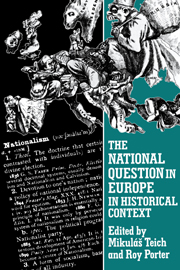Book contents
- Frontmatter
- Contents
- List of maps
- Notes on contributors
- Acknowledgements
- Introduction
- 1 The British Isles: Celt and Saxon
- 2 The making of the French nation
- 3 The national question in Italy
- 4 The roots of the national question in Spain
- 5 Shifting nationalism: Belgians, Flemings and Walloons
- 6 The nation in German history
- 7 Nationalism and nation-state in Germany
- 8 The national identity of the Austrians
- 9 The Czechs
- 10 The national question in Hungary
- 11 The union of Dalmatia with northern Croatia: a crucial question of the Croatian national integration in the nineteenth century
- 12 The national question in Poland in the twentieth century
- 13 Finland: from Napoleonic legacy to Nordic co-operation
- Index
13 - Finland: from Napoleonic legacy to Nordic co-operation
Published online by Cambridge University Press: 30 November 2009
- Frontmatter
- Contents
- List of maps
- Notes on contributors
- Acknowledgements
- Introduction
- 1 The British Isles: Celt and Saxon
- 2 The making of the French nation
- 3 The national question in Italy
- 4 The roots of the national question in Spain
- 5 Shifting nationalism: Belgians, Flemings and Walloons
- 6 The nation in German history
- 7 Nationalism and nation-state in Germany
- 8 The national identity of the Austrians
- 9 The Czechs
- 10 The national question in Hungary
- 11 The union of Dalmatia with northern Croatia: a crucial question of the Croatian national integration in the nineteenth century
- 12 The national question in Poland in the twentieth century
- 13 Finland: from Napoleonic legacy to Nordic co-operation
- Index
Summary
THE NAPOLEONIC LEGACY
Important elements of modern national feeling were created by the period of the Napoleonic wars: the growth of Romanticism in cultural terms coincided with the mass mobilization of armies, and of all population groups facing the problems of frontier, power, imperium and nation. Politico-national feelings were divided between feelings of victory and pride on the one hand, and apprehensions of disaster and danger on the other. These sentiments had a military and political matrix, but they were interpreted and enlarged into ideologies during the period itself and even more afterwards, in the rapid historical description and assessment of that change.
France was victorious even though defeated; the victories of Arcole, Austerlitz, Jena and Wagram became elements of her national identity, and from about 1840 and especially under the Second Empire a great revival of interest in interpreting the Napoleonic era began. England's victory was also commemorated, with Nelson and Wellington becoming national heroes. In contrast Austria and especially Prussia, even if saved, had to build up their identities on the fact that they had lost important battles and had been occupied by the enemy.
The Russian case is especially interesting. Napoleon's invasion of 1812 was extremely threatening, but the invader was finally forced to an almost complete defeat.
- Type
- Chapter
- Information
- The National Question in Europe in Historical Context , pp. 317 - 331Publisher: Cambridge University PressPrint publication year: 1993

